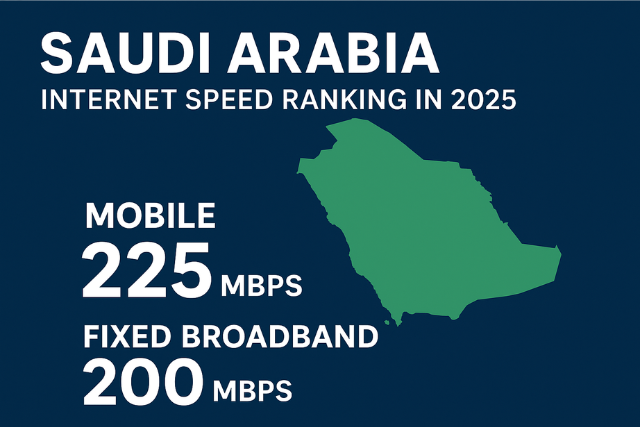Saudi Arabia Internet Speed Ranking in 2025
Saudi Arabia’s transformation in the digital and telecom sector continues at a rapid pace in 2025. The country’s investment in 5G, fiber networks, and connectivity improvements has positioned it as one of the strongest digital performers in the Middle East. Internet speed rankings—both mobile and fixed broadband—are crucial indicators of national competitiveness, digital readiness, and user experience. This article provides a complete 2025 overview of Saudi Arabia’s internet speed ranking, the factors driving improvement, and what consumers and businesses can expect in the future.
Saudi Arabia’s Internet Speed Ranking in 2025: Mobile & Fixed Broadband
In 2025, Saudi Arabia maintains a strong standing in regional and global internet speed rankings. The most recent analyses show the Kingdom performing exceptionally in mobile speed due to widespread 5G deployment, while fixed broadband speeds have climbed steadily thanks to ongoing fiber expansion.
Mobile Internet Speed Ranking in 2025
Saudi Arabia ranks among the top-performing countries in the Middle East for mobile internet speed in 2025. With widespread 5G coverage and strong operator investment, users experience high median download speeds across most urban areas. The expansion of 5G standalone architecture and dense urban deployments contributes to faster, more reliable performance.
Fixed Broadband Speed Ranking in 2025
Saudi Arabia’s fixed broadband speeds continue to rise due to extensive fiber-to-the-home (FTTH) deployment. Although fixed broadband is still catching up with leading global fiber markets, the year-over-year improvement is significant. Users in major cities like Riyadh, Jeddah, and Dammam report substantially faster and more stable fixed broadband connections in 2025.
Key Factors Driving Saudi Arabia’s Fast Internet Speeds in 2025
1. Expansion of 5G Networks
The Kingdom’s 5G rollout is one of the most aggressive in the region. Operators expanded their mid-band and high-band 5G spectrum coverage, leading to much higher median speeds. Many urban centers now have nearly ubiquitous 5G signals, improving both speed and capacity for millions of users.
2. Fiber-to-the-Home (FTTH) Growth
Saudi Arabia continues to invest heavily in nationwide fiber infrastructure. FTTH allows households to achieve significantly higher speeds, lower latency, and greater stability compared to copper-based technologies. Improved fiber packages offered by ISPs have also contributed to rising national averages.
3. Strong Competition Between Operators
Major operators—stc, Mobily, and Zain—compete vigorously to deliver the fastest network in the Kingdom. This competition accelerates infrastructure investment, encourages technology upgrades, and supports better customer experience. Awards and benchmarking tests further motivate operators to enhance speed and quality.
4. Government Digital Transformation Initiatives
Saudi Arabia’s Vision 2030 continues to emphasize digital infrastructure as a national priority. Supportive policies, efficient spectrum allocation, and investment incentives have played a major role in pushing telecom performance upward. As a result, both fixed and mobile networks show strong annual improvements in 2025.
How Saudi Arabia Compares with Other Middle Eastern Countries
Saudi Arabia competes closely with Gulf neighbors such as the UAE, Qatar, and Kuwait, which traditionally hold top global positions due to high-density populations and extensive fiber deployment. While some smaller Gulf states may still lead in specific categories, Saudi Arabia’s rate of improvement is one of the fastest in the region.
In mobile performance, Saudi Arabia performs exceptionally well, often ranking among the leading countries worldwide due to its expansive and modernized 5G infrastructure. In fixed broadband, ongoing fiber expansion ensures steady movement upward in global rankings.
What Saudi Internet Speeds Mean for Users
Consumers
- High-quality streaming: 4K and even 8K streaming are increasingly reliable.
- Improved gaming performance: Lower latency on 5G enhances cloud gaming and competitive play.
- Seamless remote work: Video calls and large file transfers are more stable and consistent.
Businesses
- Faster cloud services: Improved speeds support data-heavy applications and SaaS tools.
- Enhanced IoT deployment: Smart cities, automation, and connected devices benefit from better connectivity.
- Support for digital expansion: E-commerce, fintech, and digital operations scale more efficiently.
Coverage and Consistency Across the Kingdom
While Saudi Arabia’s average speeds are high, the experience can vary by region:
- Urban areas: Riyadh, Jeddah, Medina, and Dammam enjoy the fastest speeds due to dense 5G and fiber availability.
- Rural areas: Certain remote regions still experience slower connectivity, though ongoing fiber rollout and 5G coverage expansion aim to close the gap.
- Device differences: Users with older smartphones or outdated routers may notice lower performance.
How Internet Speeds Are Measured
Different organizations use varied methodologies to measure speeds. Some use median download speeds, others use mean averages. Tests may be collected from actual user devices or controlled measurement tools. Despite these differences, the overall trend remains consistent: Saudi Arabia’s internet speeds—in both mobile and fixed broadband—continue to rise significantly in 2025.
Tips for Getting the Best Internet Speed in Saudi Arabia
- Upgrade to a 5G-compatible smartphone if you haven’t already.
- Switch to a fiber plan if available in your area.
- Use a mesh Wi-Fi system in larger homes for better coverage.
- Restart routers regularly to improve performance.
- Run tests at different times of day to detect congestion patterns.
Future Outlook for Saudi Internet Speeds
The momentum toward faster and more stable connectivity will continue beyond 2025. Expect expanded fiber coverage, more advanced 5G standalone deployment, wider mid-band spectrum usage, and better latency performance. As businesses increasingly rely on cloud services and IoT, operators will continue prioritizing upgrades to meet demand.
Saudi Arabia’s internet speed ranking in 2025 is a strong reflection of the country’s transformation into a global digital leader. High mobile speeds fueled by 5G and rapidly improving fixed broadband through fiber expansion ensure a powerful, future-ready connectivity landscape. Whether for consumers enjoying seamless streaming or businesses scaling with digital services, the Kingdom’s internet infrastructure continues to evolve at an impressive pace.
